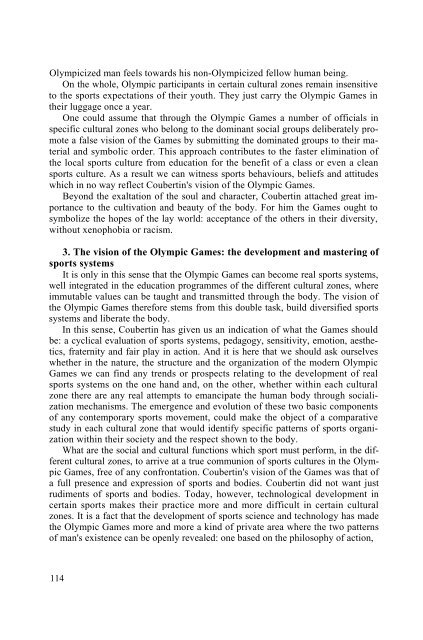You also want an ePaper? Increase the reach of your titles
YUMPU automatically turns print PDFs into web optimized ePapers that Google loves.
Olympicized man feels towards his non-Olympicized fellow human being.<br />
On the whole, Olympic participants in certain cultural zones remain insensitive<br />
to the sports expectations of their youth. They just carry the Olympic Games in<br />
their luggage once a year.<br />
One could assume that through the Olympic Games a number of officials in<br />
specific cultural zones who belong to the dominant social groups deliberately promote<br />
a false vision of the Games by submitting the dominated groups to their material<br />
and symbolic order. This approach contributes to the faster elimination of<br />
the local sports culture from education for the benefit of a class or even a clean<br />
sports culture. As a result we can witness sports behaviours, beliefs and attitudes<br />
which in no way reflect Coubertin's vision of the Olympic Games.<br />
Beyond the exaltation of the soul and character, Coubertin attached great importance<br />
to the cultivation and beauty of the body. For him the Games ought to<br />
symbolize the hopes of the lay world: acceptance of the others in their diversity,<br />
without xenophobia or racism.<br />
3. The vision of the Olympic Games: the development and mastering of<br />
sports systems<br />
It is only in this sense that the Olympic Games can become real sports systems,<br />
well integrated in the education programmes of the different cultural zones, where<br />
immutable values can be taught and transmitted through the body. The vision of<br />
the Olympic Games therefore stems from this double task, build diversified sports<br />
systems and liberate the body.<br />
In this sense, Coubertin has given us an indication of what the Games should<br />
be: a cyclical evaluation of sports systems, pedagogy, sensitivity, emotion, aesthetics,<br />
fraternity and fair play in action. And it is here that we should ask ourselves<br />
whether in the nature, the structure and the organization of the modern Olympic<br />
Games we can find any trends or prospects relating to the development of real<br />
sports systems on the one hand and, on the other, whether within each cultural<br />
zone there are any real attempts to emancipate the human body through socialization<br />
mechanisms. The emergence and evolution of these two basic components<br />
of any contemporary sports movement, could make the object of a comparative<br />
study in each cultural zone that would identify specific patterns of sports organization<br />
within their society and the respect shown to the body.<br />
What are the social and cultural functions which sport must perform, in the different<br />
cultural zones, to arrive at a true communion of sports cultures in the Olympic<br />
Games, free of any confrontation. Coubertin's vision of the Games was that of<br />
a full presence and expression of sports and bodies. Coubertin did not want just<br />
rudiments of sports and bodies. Today, however, technological development in<br />
certain sports makes their practice more and more difficult in certain cultural<br />
zones. It is a fact that the development of sports science and technology has made<br />
the Olympic Games more and more a kind of private area where the two patterns<br />
of man's existence can be openly revealed: one based on the philosophy of action,<br />
114

















